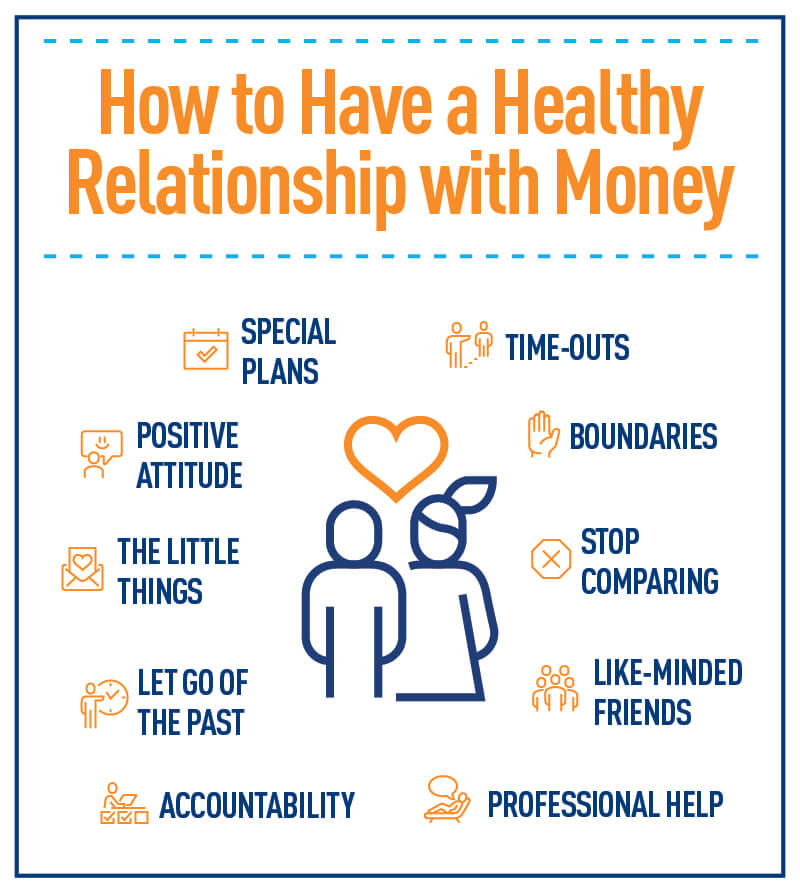
Financial Education
10 ways to build a healthy relationship with money
In this article
- Prioritize and cultivate a positive and mindful approach to money.
- Build smart financial habits: Learn to budget, save, and invest wisely.
- Understand the emotional side of financial decisions.
- Seek help from a trusted financial advisor and surround yourself with others who have good relationships with money.
Nurturing a positive money relationship can be a bit of a rollercoaster. Thriving with retirement savings is exhilarating; student loan debt can feel discouraging. And daily budgeting? Well, at times that can also be a struggle.
Like all relationships in life, your relationship with your money isn’t easy or perfect. But with ongoing effort and commitment, you can strengthen your bond, so you can improve your financial security, reach your money goals and build a strong future together.
First, prioritize this relationship. Then, adopt some of the following practices to help you create and maintain a stable and healthy relationship with money.

1. Plan something special each month
Money is a tool used to meet your needs and achieve your goals — but it should also bring you joy. If your money doesn’t give you pleasure here and there, then you’re going to get burnt out. The smart way to enjoy your money is to plan for it. Set up a mini savings category in your budget and plan something extra fun for you and your money to do once a month.
2. A good attitude matters
A positive money mindset and the right attitude can strengthen your relationship. Maybe you’re thankful for a job that provides you with an income. You could appreciate and be grateful for what you already have, which helps you buy less stuff to make you happy. Or perhaps you’re proud of boosting your savings. A positive mindset empowers your relationship!
3. It’s the little things
Pay attention to the little things. If you indulge in a gourmet coffee on a Sunday morning, take the time to really enjoy it. You could also buy a small gift for a friend or celebrate a mini money win (like avoiding any impulse purchases for a week). Acknowledging the little things can help keep you and your money on good terms.
4. Keep the past in the past
Mistakes are learning lessons, like abusing credit cards, ‘cheating’ on your budget or partnering with a bank instead of a credit union. Move forward by letting go and work toward correcting those mistakes. There’s no point in regretting decisions from the past. Also, be kind to yourself. You and your money are allowed to have financial hiccups.
5. Admit when you’re wrong
Some people can’t admit when they’ve made a financial mistake or are in denial about their poor relationship with money. Being honest about your financial situation, while admitting wrongdoing, is a necessary step for going from financial struggles to financial stability. So, try to ditch the excuses and look at your relationship through transparency.
6. Call time-outs
Sometimes, you just need some space from financial planning and thinking about money. Being overly critical in a relationship with a partner, nitpicking every purchase and constantly worrying about reaching a financial goal can potentially do more harm than good. Strive for balance. How can you monitor your finances without obsessing over every detail?
7. Block out the noise
Be cautious — external factors and bad influences can sabotage your relationship. Do spendy friends frequently pressure you to go out or take a trip? Do neighbors brag about big purchases? Do nosy family members always have an opinion about your financial habits? To preserve a healthy relationship with your money, you’re going to have to set boundaries.
8. Comparison is toxic
Ahh, the comparison trap. It seems like others have the perfect relationship with money because of their cushy lifestyle or flashy purchases. But as the saying goes, “looks can be deceiving” — and that deception can have a negative impact on your own relationship. Remind yourself to focus on you and avoid resentful thoughts like “it isn’t fair!” or “must be nice.”
9. Who’s in your circle?
You are who you surround yourself with, right? It’s beneficial to stay close to those who generally share the same financial outlook and values as you. People who have good relationships with their money can motivate you to keep a good relationship too. Just make sure to again, not make comparisons, and focus on how they help you stay on the course.
10. Sort it out with professional counseling
It’s OK to ask for help. You can read all the books, follow all sorts of social media accounts about money and have the best of intentions — but for some things, like debt, investing and refinancing, you may need some guidance. If something’s not working or you’re unsure about what to do, seek outside help to repair or improve your relationship with your finances.
Like all types of relationships, your relationship with your money will evolve. Think about when you increase your income, start a family, make a large purchase or retire — life changes and so will your finances. So, as your relationship continues to grow and shift, keep in mind these 10 tips that can help you build and sustain a healthy relationship with money.
Related content
Subscribe to our blog
Fill out the form below to sign up for our blog.
